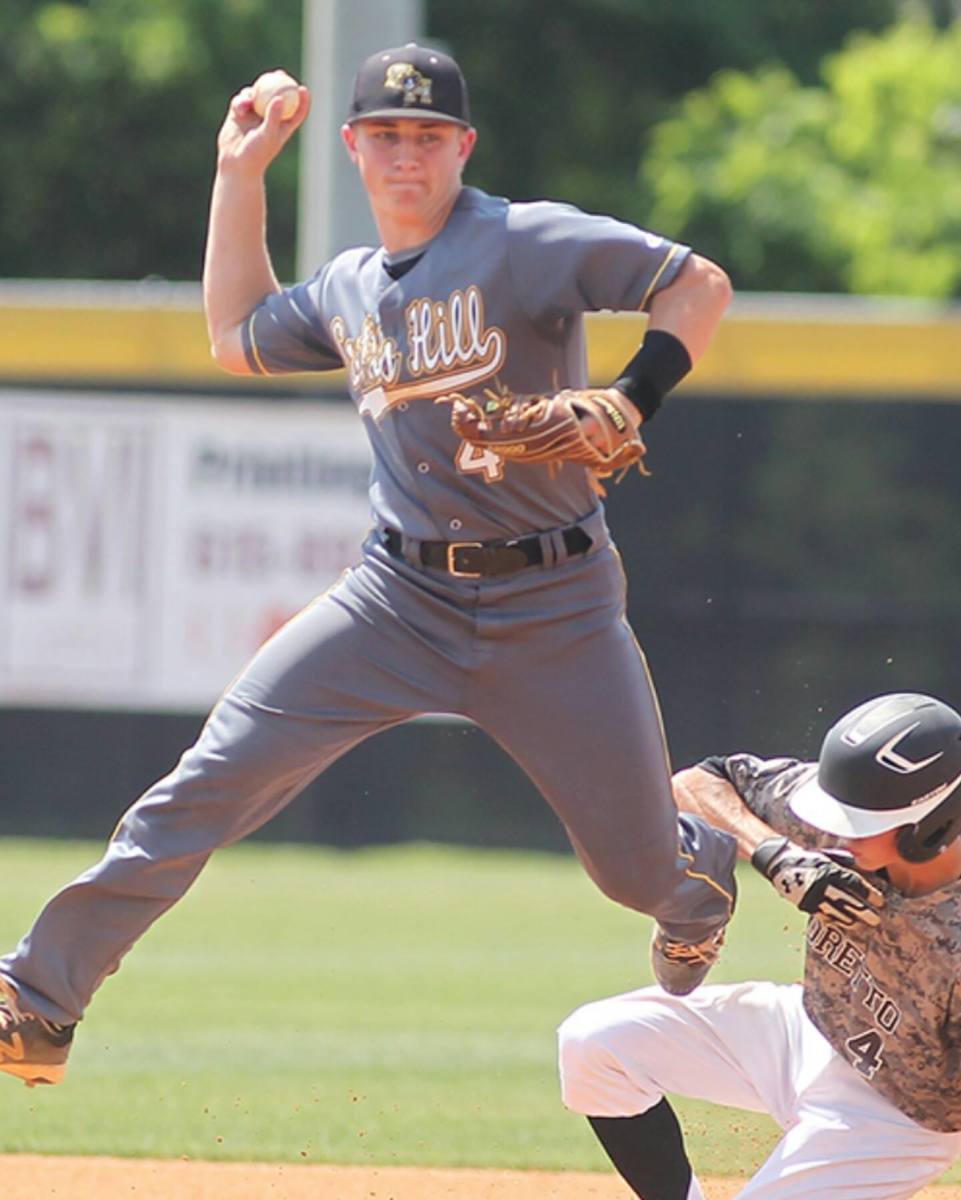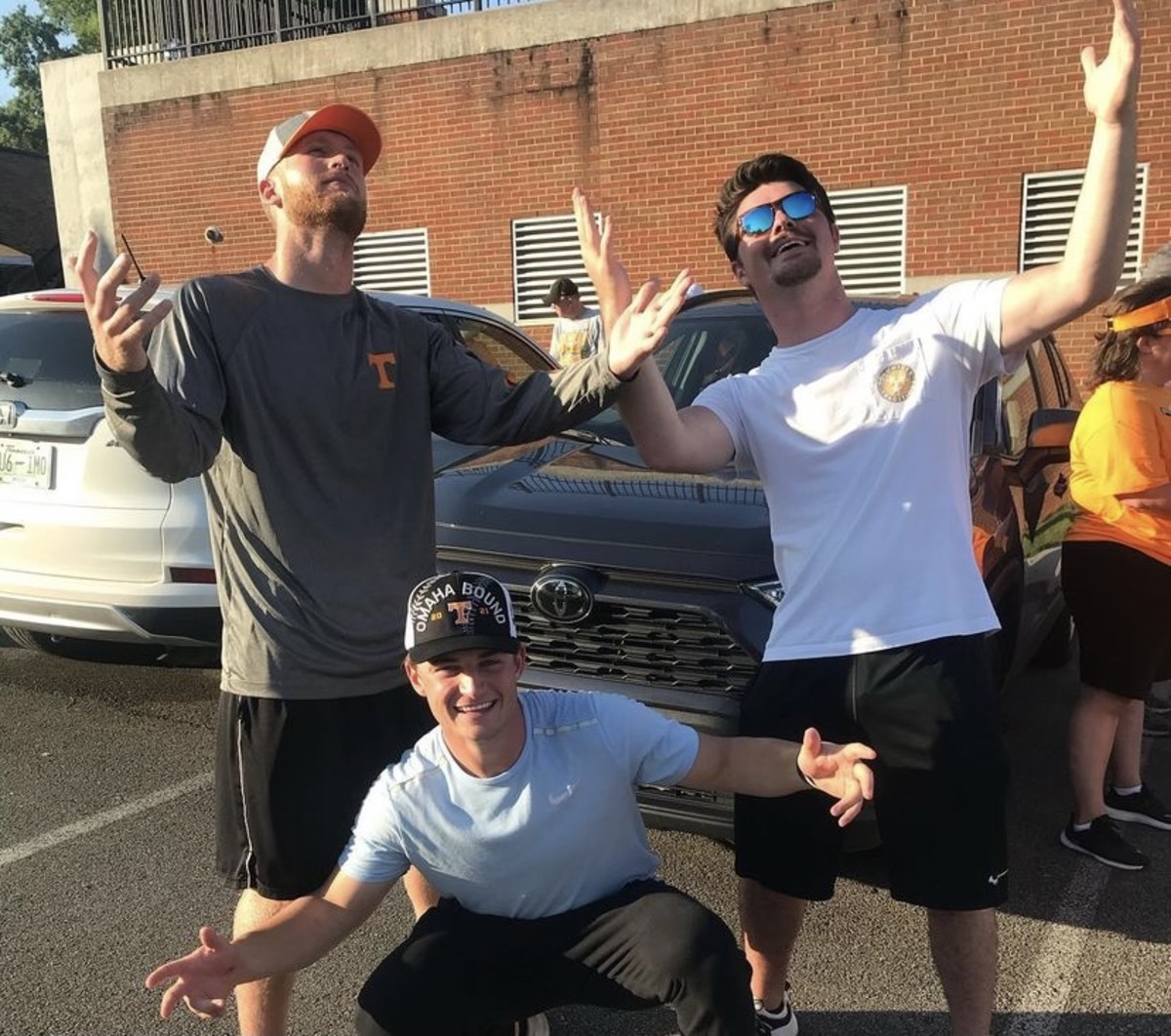Evan Russell’s Road to Omaha: the Lion, the Vol, the Underdog and the Best Friend
The story of Evan Russell — at least, the part that ends with him wearing an orange No. 6 jersey in the College World Series — begins in Dyer, Tennessee.
It is early summer, and the year is 2016.
Long before the grand slam against Vanderbilt and well before his ‘villainous’ comments in college, Russell is a 17-year-old junior at Scotts Hill High School.
His baseball prowess has generated buzz from Middle Tennessee and Mississippi State, but nothing yet from Tennessee’s flagship school in Knoxville. The one that, according to then-assistant coach Michael Stroup, Russell has dreamed of since he was “knee-high to a grasshopper.”
But on this day, Russell isn’t focused on his long-term future. All that’s on his mind is the short-term, as his team has to advance past Gibson County to crack the state championship tournament in Murfreesboro.
The game comes down to the final sequence. One out, a runner on third, and the Lions induce a double play to clinch the win. The celebration is on: they’re headed to State.
The twists don’t stop there, though. After the Lions reach the state tournament, coaches from Team Tennessee -- a travel team based in the Volunteer State -- catch a Scotts Hill game in Murfreesboro.
Because they’re missing a player due to injury, the coaches extend an offer to Russell. He accepts, then heads to a tournament with the team in Oklahoma later that summer.
“It’s a God thing, really,” said Evan’s father, Jason.
The performance in Oklahoma -- “he went off,” Stroup says, “like 18-for-21” -- generates an immediate offer from then-Tennessee coach Dave Serrano.
“Without doing any of that, he possibly doesn’t go to Tennessee at all,” says Stroup, who was also Russell’s head football coach at the time. “Because if he’s not in the state tournament at Middle Tennessee Christian, then the coaches at Tennessee don’t see him.
“And the rest is history.”
Of course, that moment isn’t the only one that brought Evan Russell to Knoxville, or what has propelled him here to Omaha.
Underneath the big plays and story-worthy comments, there have also been several smaller clips: bats in trash cans, kids at football camps, and a tackle that inspired a locker room.
The journey, as Russell put it recently, “hasn’t all been sunshine and rainbows.”
Some moments have been hard. Others have been easy.
And yet, he’s here anyway — 918 miles from Knoxville and 662 miles from that field in Dyer — at TD Ameritrade Park, the pinnacle of college baseball.
Can Tennessee win it all, giving Russell a full-circle moment going back to the state championship he won just days after that career-altering game?
Time will tell. But before writing the future, we must first go back to the past. Back to stories that — for better or worse — paint the fullest picture possible of Tennessee’s No. 6 and Scotts Hill’s No. 4.
And it all begins in in Lexington, Tennessee, with a kindergartener who couldn’t forget.
Driven to success ‘from an early age’
Jason Russell remembers the moment like it was yesterday.
“Evan was playing kindergarten basketball,” he says, moving his hands to emphasize the age at which this snapshot took place. “And the referee called a walk on him.”
One week after that game, Jason arrived home to find 5-year-old Evan dribbling a basketball in the front yard.
He was practicing from the previous game. From the walk call that still consumed him.
“That,” said little Evan, “will never happen again.”
Fast forward a few years to Evan in third grade.
Still playing multiple sports, still just in elementary school.
Yet already knowing what he would become.
“He told his mom and I, in the third grade, that he was going to play baseball in the SEC,” Jason says. “He knew…. from a very early age.”
That knowledge went beyond future predictions, stretching onto the field and into the classroom.
‘A student of the game’
Before accepting a job as the head football coach and athletic director for University School of Jackson in 2017, Stroup served as the football coach and as an assistant baseball coach at Scotts Hill.
So he remembers vividly the day he met Evan Russell.
“Oh yeah,” Stroup recalls with a chuckle. “He wanted to play quarterback.”
Did eighth-grade Evan get the job?
“No,” Stroup says of the “tall, lanky” kid that filled out to “look like a pencil” by the time he became a freshman.
“Big-headed, thin…. He looked like Captain America before he transformed into Captain America.”
Still, “he was just so focused,” even that first day.
“Most kids, they’re not that focused at that age,” Stroup says. “(Evan) was just locked in and wanted to learn more.”
“He was just a student of the game, wanted to learn as much as he could about the game. Evan wanted to know why he was doing it and how it set up in the puzzle. He was like that in everything he did.”
From football to baseball, from the field to the classroom — Evan wanted to know why.
But he also wanted to show why.
Why he belonged. Why he deserved. Why he’s gotten where he is today.
His Finance degree from Tennessee has certainly helped, as did the 4.0 he carried through high school.
One academic impact hit particularly hard for former Scotts Hill baseball coach Carl Harken, who is now at Germantown.
According to Harken, Evan was pressed for time in his senior year with a deadline fast approaching. For most kids, this was the time to coast. Not so for Evan Russell.
“He had to turn in three assignments the last week of school to be recognized in the Top 10 for graduation,” Harken says.
He did.
“Evan is a great student,” adds Stroup. “Very smart kid in the classroom.”
“That’s who Evan is. I don’t care if it’s hopscotch or Tic-Tac-Toe. He wants to beat you, he wants to win. That exudes in work ethic, and people see how hard you work. But it’s just competitiveness. He wants to put in the time.”
Playing through it
But academics and baseball aren’t Russell’s only lifelines to a competitive edge. One can also look to his career in high school football.
Like countless other teams across the nation, the Lions would hold off-season lift sessions early on weekday mornings.
The workouts would start at 6 a.m., and Russell — bleary-eyed after a few hours of sleep — would arrive after a full weekend of travel baseball.
“He wasn’t going to let anybody outwork him,” Stroup says. “He’s always out in his kind that somebody was trying to outwork him, and it would be a race. He’s been that way as long as I’ve known him.”
“A lot of people call it work ethic, and I call it competitiveness. He just wants to be the best.”
In fall 2016, Russell was a senior on the Lions’ football team. He had gotten Tennessee baseball’s attention just a few months prior, but was still looking to finish strong in all facets of high school.
A 42-14 deficit against Wayne County did not fit into that picture.
“I go after the best guy in the room,” Stroup says. “People are going to feed off him.”
They did, and he answered. On the first snap of the second half, Evan — an outside linebacker — got a jump on a toss play, de-cleating the running back in the process.
The moment almost turned into a scoop-and-score, and the Lions rode the momentum until they clinched the lead with two minutes left.
“We lost the game. But we came back because of that intensity, that competitiveness,” Stroup adds. “You go in there and you challenge kids…. Evan played games with a broke hand. He didn’t have to play, but he played. He (played catcher) growing up, so he’s got bunions on his toes that would give him all kinds of pain. But he played through it.”
The same toughness has lasted for Russell at Tennessee, as Tony Vitello has called him “a cockroach” because “he’s hard to kill.”
“When you have a coach and players that are competitive, and they share that…it’s awesome to coach,” Stroup adds.
“It’s not something he learned at Tennessee,” Stroup continues. “He got that from playing at Scotts Hill. I did not take it easy on him. I would make comments to the point where, ‘You’re not as good as you think you are.’”
The ensuing frustration boiled over on more than one occasion. But no act seemed to come more often than the post-strikeout bat toss.
“When he first got to Scotts Hill, he’d get upset because he thought a lot of the (baseball) guys didn’t like him,” says Harken. “He’d get upset about that and work harder. Hell, even when he was a senior and he’d strike out once or twice, you’d find a $300-dollar bat in the trash.”
With such short, costly slumps, Russell’s Tennessee scholarship may have just paid back the amount he owed in thrown-away aluminum.
But the pressure response he’s formed since has become invaluable.

Finding a place and sticking around
When Vitello was hired in 2017, that left Russell — then an incoming freshman — searching for a place among UT’s roster.
Eventually, Russell stuck around using the same method he’d been taught at Scotts Hill: by being a “hard-nosed, blue-collar player,” according to Jason. “He realized that’s the kind of player Vitello wanted.”
“When you think about how he started at Tennessee, it wasn’t an easy path to begin with,” continues Scotts Hill baseball assistant Drake Thompson, who played in high school with Russell and remains one of his best friends. “He comes in, then you have a new coach, and he’s got to work his way in the lineup. He came in not knowing what position he would play in college, and one day he’s playing left field.
“It’s like, ‘Of course he is,’ because it’s the only way it would work out. You kind of knew it would happen eventually, anyway.”
Four years later, that expectant approach is still a defining approach for Russell and Tennessee as a whole. But so is the role of an underdog.
“He’s always got a 3-2 count.” Stroup adds. “He’s got that mentality where, he’s going to die trying. He ain’t the tallest on the field, he ain’t the fastest on the field. But you can’t put him away because of his work ethic and his competitiveness.”
UT fans have since latched onto the mentality, especially with Russell’s comments about villainy and not being satisfied.
“I think it's time for Tennessee to step up to the fight,” he said before the LSU Super Regional. “And I don't think anybody, including our fan base, are afraid to be the villains. I think that's what makes makes this place special, is that starting with our coaching staff and our players, we enjoy getting in a fight, and we enjoy the close games, and you know, we enjoy the competition.”
That mindset stems from Tennessee’s rise through the SEC, but it also traces back to when Stroup would challenge his players at Scotts Hill, telling them, “You’re just Scotts Hill, a little country, podunk school” to reinforce the point.
And Russell has done the same for Tennessee in Omaha.
“We’re not here just to be here,” he said on Saturday. “We’re here to make a statement.”
After that?
“Before we got here, I was thinking there’s no way to top this season, so I should just go ahead and turn pro,” Russell said. “But then we got here, and now I’m not so sure. I have to think about it.”
Either way, Russell may not be too focused on his future right now.
Instead, like that day back in west Tennessee, his entire focus is on the short-term.
“We were talking about how this feels like our state tournament run,” says Thompson on Sunday. “Now it feels like I’m watching my brother go out there to play his final few games in college baseball, and I’m just hoping and praying that they can pull it off.
“In these huge moments, we’ve seen him come up big and just feel like we could pass out. Winning that state championship still feels unreal now. If I was to see him win a College World Series…. It would be overwhelming.”
‘You have no idea’
Whether Tennessee “overwhelms” the rest of this eight-team Omaha slate is a fair question, especially with Sunday’s tight finish between Vanderbilt and Arizona.
One question that isn’t fair, though? Any argument that pokes holes in Russell’s legacy at home.
“He’s almost like a folklore hero,” said current Lions baseball coach Chuck Cooper, who replaced Harken.
Is Evan aware of the effect?
“I don’t think he really does (know),” Thompson says. “I don’t think he knows the excitement he’s generated around this area. I don’t think he knows the excitement people get from seeing him on TV.”
The attraction has remained strong both ways, though. When Russell would help with Stroup’s football camps as a high-schooler, Stroup said Russell “would have the biggest group of kids out there.”
“He’s the biggest 8- or 9-year-old kid in America,” Stroup says with a chuckle.
Russell’s mindset was similarly compassionate last week. After the Vols beat LSU 15-6 to clinch their first spot in Omaha since 2005, Russell walked around to hug family members and took extra time with older relatives.
Then, he posed for a picture with his friends to reenact their state championship photo from five years ago.


In these ways, Scotts Hill natives and Tennessee fans have become forever sewn.
Not just from Russell’s wins and losses, but because those results have come by the characteristics and the community that built him.
And because somewhere, deep down, Russell is still that same 17-year-old kid in Dyer.
The one who, five years ago, worked with his best friend — Thompson fielding at first, Russell racing from the mound — on the double play that knocked the first domino on Evan Russell’s Road to Omaha.
“The generation of the ones that played with him has kind of played itself out,” Thompson says. “I’ve coached all the classes that knew him. Being there, talking to them, they’re like, ‘Did you see what Evan did?’ And I’ll just be like, ‘Yeah, I was texting him about it this weekend.’ Like, he’s still my best friend.’”
Image credit: Tennessee Athletic Communications
